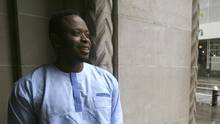Ken Wiwa, son of slain author and television producer Ken Saro-Wiwa, poses in New York May 4, 2009.
Nigerian author and political activist Ken Wiwa, a former feature writer and columnist at The Globe and Mail, has died at the age of 47. He died in a hospital in London after a brief illness and a stroke, Nigerian media reported. His family confirmed his death.
He was the eldest son of Ken Saro-Wiwa, an activist for the Ogoni people who was one of nine people executed by Nigeria’s military government in 1995 after they campaigned against the oil multinational Royal Dutch Shell for polluting the Niger Delta with its vast network of pipelines and oil fields. Their secret trials and executions sparked global condemnation and led to Nigeria’s suspension from the Commonwealth.
Mr. Wiwa wrote a critically acclaimed memoir, In the Shadow of a Saint, published in 2000. The book focused on his complex and sometimes tense relationship with his father and his efforts to forge an independent identity while still continuing his father’s environmental and human rights activism.
Educated in Nigeria and Britain, Mr. Wiwa moved to Canada in 1999 and became a writer-in-residence at Massey College in the University of Toronto. He wrote features and columns for The Globe and Mail and was twice nominated for a National Newspaper Award for his eloquent writing on Canadian subjects.
He was first nominated in 2002 for a story in which he followed the path of Yonge Street nearly 1,900 kilometres from the shores of Lake Ontario to the U.S. border at Rainy River, Ont. He was nominated again in 2003 for a feature on Calgary Flames star Jarome Iginla.
He wrote for many other international media, including The Guardian and the New York Times, and produced and narrated radio and television documentaries for CBC and BBC.
Mr. Wiwa returned to Nigeria in 2005. Believing that he could help Nigeria more effectively by working within the government, he served as a special assistant to three Nigerian presidents, including Goodluck Jonathan, with whom he worked closely. He worked as a special assistant on issues such as conflict resolution, reconciliation and international relations. Much of his work focused on the Niger Delta, still plagued by the environmental disasters that his father had tried to prevent.
At the time of his father’s execution, he was in New Zealand at a Commonwealth summit, trying to persuade Commonwealth nations to take stronger action against Nigeria to deter it from executing his father and the other Ogoni activists. Instead the summit chose a policy of “constructive engagement” with Nigeria, and the executions went ahead.
“I was 26 years old and found myself on a world stage, blinking in the spotlight and bewildered by the strength of the forces and passions that my father’s death had unleashed,” Mr. Wiwa wrote in his memoir.
He came from a literary tradition: his father was a newspaper columnist and author as well as a political activist. In one of his last letters to Mr. Wiwa, he urged his son to write, and the letter inspired his son to become an author.
His memoir, In the Shadow of a Saint, examined the tensions between fathers and sons, and between exile and home. He had sometimes felt angry and resentful that his life choices had been restricted by his father’s fame and legacy, and by the pressures to continue his father’s environmental fight.
“Where does he end and where do I begin?” he wrote of his father.
“I seem to have spent my whole life chasing his shadow, trying to answer the questions that so many fathers pose to their sons. Is my life predetermined by his? My future defined by my past? Is his story repeating itself through me, or am I the author of my own fate?”
At the age of 23, he legally changed his name to Ken Wiwa as a gesture of independence from his father, but later in life he often returned to using his birth name, and in Nigeria he was better known by that name.
Source: Globe and Mail


